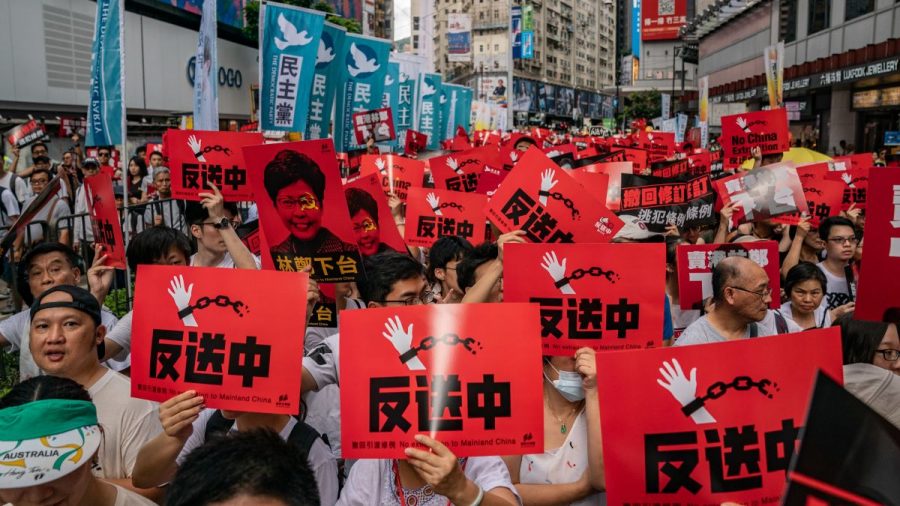The Hong Kong and China Crisis: Is the CCP Overstepping Their Boundaries?
Hong Kongers can be seen protesting against an extradition bill that will require Hong Kong prisoners to hold trial in mainland China
October 13, 2019
The political unrest in Hong Kong is changing the very foundation of Chinese politics and has sparked a rebellion that has received worldwide attention. Marches and protests fill the streets; however, many people around the world doubt their effectiveness and consider Hong Kong one of many areas that fell into the territory of the ruthless Chinese government. The escalation of events has created a new unsteady future of political rivalry between China and Hong Kong. These protests are for a righteous cause because the Chinese Communist Party (CCP) has no right infringing on the Hong Kongese rights as they are bound by a legal contract, which grants Hong Kong its own political system and allows citizens to exercise certain rights that mainlanders don’t have access to.
Hong Kong is vastly different from mainland China in the sense that residents of the city are granted basic rights that mainland Chinese people do not have. They are almost democratic in the sense that citizens have some degree of influence over their government, such as being able to vote in the legislative council and district council elections.. This is due to the fact that Hong Kong was ceded to the British after the Opium War(1839-1842;1856-1860) and remained under British rule for another 99 years as part of an agreement between both countries. In 1997, Britain handed Hong Kong back to China. However, the people of Hong Kong didn’t properly assimilate because after being under British rule, they realized they had certain rights and privileges , like being able to vote, that China didn’t have and were not willing to adjust a lower form of life. A new law in Hong Kong, published on March 29 of this year, decreed that convicted citizens on the island could be taken to mainland China for trial. This outraged many people in Hong Kong, since fair trial was not guaranteed in the mainland. For example, Gong Shengliang, was a pastor was unfairly sentenced to death, and although his sentence was reduced, his health is deteriorating due to multiple beatings in prison. The new bill also contained dangerous implications–the CCP could use this bill to silence their many critics in Hong Kong, and if this bill was passed, it could prompt a whole new set of laws that would slowly strip the island of its rights. . And they were right to do so, as it is not the Chinese Communist Parties’ (CCP) place to do so. Hong Kong has its own government, not a spin-off of theirs (CCP), so they shouldn’t get involved where they don’t belong. While technically, Hong Kong belongs to China in the sense that it is the country that it is affiliated with on legal documents and such, they have their own system which the CCP has no right to infringe on. They have no right to be involved in any political decisions regarding Hong Kong since they both have separate legal systems. There would be no point to Kong Kong’s own legal system if they can’t even use it. The system is set to be in place for 50 years after Britain handed Hong Kong back to China, but that agreement is nowhere close to being over. When the 50 years are up, then they can choose to do with Hong Hong what they will. If they want to start incorporating their own laws in Hong Kong, they will have to wait, as this is a legal requirement. The CCP is enforcing laws in regions that they legally should not be able to touch. With the continual protests in Hong Kong, the people have made their voices clear—China should take the hint and back off.
The end result of the feud between mainland China and Hong Kong may not have a foreseeable future now, but the CCP needs to understand that the will of the Hong Kong people is hard to crack and that further actions against protesters may escalate the situation and increase violence. To preserve the relationship between Hong Kong, China should take back their bill and leave Hong Kong’s democratic system alone.










